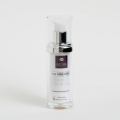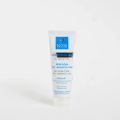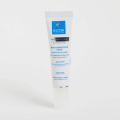Niacinamide: A Powerful Ally for Dark, Olive, and Mixed Skin
Niacinamide, also known as vitamin B3 or nicotinamide, has become a star ingredient in the cosmetic world. But what about dark, olive, and mixed skin? Is this versatile active truly suitable? What are its benefits, contraindications, and how can it be used effectively to enhance melanin-rich skin?
The Benefits of Niacinamide for Dark, Olive, and Mixed Skin
Darker skin types have specific needs: they are often prone to post-inflammatory hyperpigmentation (PIH), higher sebum production, and increased dryness due to a fragile skin barrier. Niacinamide addresses these multiple needs with its unique properties:
1. Reduction of Dark Spots
Niacinamide inhibits the transfer of melanin to keratinocytes. This helps to reduce hyperpigmentation and dark spots, which are common after breakouts or skin irritation.
Ideal for fighting melasma and post-acne spots on dark skin.
Discover MEL'OYA Correcting Serum
2. Strengthening the Skin Barrier
It stimulates ceramide production, thus reinforcing the skin’s lipid barrier. The result: improved water retention and softer skin, less prone to flaking visible on dry skin.
3. Anti-inflammatory Action
Excellent for soothing redness, irritation, and inflammation. Useful in cases of inflammatory acne or sensitive skin.
4. Sebum Regulation
Niacinamide helps balance sebum production, thus limiting the appearance of breakouts and blackheads without drying out the skin.
Discover ACN'OYA Anti-Imperfection Skincare
Contraindications and Precautions for Dark Skin
While niacinamide is well tolerated by most skin types, it is important to take certain precautions:
- Do not combine with vitamin C (ascorbic acid) in the same routine: these two actives may cancel each other out or cause irritation on sensitive skin.
- For ultra-sensitive skin, start with a low concentration (2-5%) to avoid redness or tingling sensations.
- Avoid formulations with very low pH, which may irritate dark skin already prone to inflammation and PIH.
Pure or Integrated Niacinamide? Which Form to Choose?
Niacinamide can be used:
- In serum form: concentrations between 5% and 10% are ideal for dark skin. Avoid serums above 10% which may irritate without providing additional benefits.
- Integrated in a cream: perfect for dry or sensitive skin, as the effect will be gentler.
- Pure (powder): avoid for home use as improper dosing can irritate and worsen hyperpigmentation.
Which Skin Concerns Can Benefit from Niacinamide?
| Concern | Why Niacinamide? |
|---|---|
| Post-inflammatory hyperpigmentation | Reduces melanin transfer |
| Excess sebum | Regulates production without drying |
| Acne (inflammatory and comedonal) | Anti-inflammatory and sebum-regulating effect |
| Dull skin | Improves radiance and evens out the complexion |
| Dehydrated skin | Strengthens the skin barrier |
Tip: Combine Niacinamide with Other Compatible Actives
- Hyaluronic acid: for deep hydration.
- Azelaic acid: to even out skin tone and act on hyperpigmentation.
- Gentle retinoids: alternate in the evening to boost cell renewal.
To Avoid for Melanin-Rich Skin
- Niacinamide + harsh exfoliants (strong AHA/BHA) without professional advice: risk of irritation and reactive hyperpigmentation.
- Concentrations above 10% if your skin has never been exposed to this active.
Niacinamide, a Must-Have for Dark Skin
Niacinamide is a versatile and well-tolerated active, ideal for correcting spots, balancing sebum, and strengthening the skin barrier of dark, olive, and mixed skin. When integrated gradually into a tailored routine, it becomes a key asset for a luminous and even complexion.
Key takeaway: opt for gentle formulas, a concentration of 5-10%, and never forget sun protection to maximize results.




